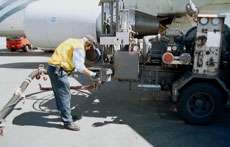Aircraft Temporarily Grounded, But Some Flew With Bad Fuel
The biggest controversy in Israel right now has nothing to do
with the Palestinians or disbanding Jewish settlements in the Gaza
Strip. The biggest controversy is about fuel -- aviation fuel.

Thousands of passengers were grounded Monday and Tuesday after
line crews discovered the Jet-A stored in tanks at Ben-Gurion
International Airport was contaminated. Even though airport
officials moved fast to ground those planes that had tanked up
before take-off, some apparently made it into the air before the
discovery. How many isn't yet known.
One Israeli newspaper said its reporters learned that the fuel
contamination was suspected by airport workers as early as Monday
afternoon. But several hours apparently passed before flights were
grounded and fuel tanks pumped out.
"We were made aware that there was a problem late at night - not
in the afternoon," said Yoav Levy, El Al's deputy general manager
for commerce and aviation relations. He told the Israeli newspaper
Ha'aretz, "Some of the planes that were due to take off had already
been filled with fuel. We very quickly got organized and started to
bring in fuel using tankers belonging to the Ashdod oil refinery.
We managed to refuel some of the long-distance flights,
particularly those heading for the Far East. Other flights were
forced to land in Cyprus and Turkey to refuel, and to continue from
there."
 Avi Friedman, head of the foreign
airlines association in Israel and CEO of Continental's operation
in the country called the incident "a disgrace. It's scandalous
that in Israel in 2005, they suddenly find all kinds of foreign
elements in jet fuel. Thousands of passengers have been
inconvenienced, and the airlines have sustained financial losses.
We will demand compensation."
Avi Friedman, head of the foreign
airlines association in Israel and CEO of Continental's operation
in the country called the incident "a disgrace. It's scandalous
that in Israel in 2005, they suddenly find all kinds of foreign
elements in jet fuel. Thousands of passengers have been
inconvenienced, and the airlines have sustained financial losses.
We will demand compensation."
Continental aircraft operating from Ben-Gurion were forced to
hop over to Ovda Air Base in the Negev Desert before they could
take on fuel and continue to their destinations.
"The runway at Ovda is too short for a wide-bodied plane such as
the Boeing 777 we operate on the Israel line," said Friedman. "So
we were forced to take off from Ovda without filling the planes,
and land again in London for another refueling, before continuing
to Newark. All of these landings and take-offs cost a lost of money
in fees for airport use, as well as the cost of the fuel. In
addition, our air crews had to work for more hours than usual. The
delays caused by having to land to refuel left the company's
international schedule in tatters, since planes landing from Israel
are then scheduled to continue to another destination."
 Were any aircraft or passengers
endangered by the contamination? A spokesman for Israel's Airports
Authority vehemently insisted there was not. "Despite the
inconvenience caused to passengers, safety concerns are our top
priority. Fuel that is contaminated can cause severe problems for
airplanes and can endanger the passengers. The Airports Authority
has contingency plans for just such exceptional circumstances,
which involve refueling planes in Cyprus."
Were any aircraft or passengers
endangered by the contamination? A spokesman for Israel's Airports
Authority vehemently insisted there was not. "Despite the
inconvenience caused to passengers, safety concerns are our top
priority. Fuel that is contaminated can cause severe problems for
airplanes and can endanger the passengers. The Airports Authority
has contingency plans for just such exceptional circumstances,
which involve refueling planes in Cyprus."
The investigation into how the fuel became contaminated --
especially in light of the fact it's pumped from the refinery to
the airport in a dedicated, underground pipeline -- was just
getting underway. Officials set a May 31st deadline for release of
the preliminary report.
 ANN's Daily Aero-Linx (05.06.25)
ANN's Daily Aero-Linx (05.06.25) ANN's Daily Aero-Term (05.06.25): Ultrahigh Frequency (UHF)
ANN's Daily Aero-Term (05.06.25): Ultrahigh Frequency (UHF) ANN FAQ: Q&A 101
ANN FAQ: Q&A 101 Classic Aero-TV: Virtual Reality Painting--PPG Leverages Technology for Training
Classic Aero-TV: Virtual Reality Painting--PPG Leverages Technology for Training Airborne 05.02.25: Joby Crewed Milestone, Diamond Club, Canadian Pilot Insurance
Airborne 05.02.25: Joby Crewed Milestone, Diamond Club, Canadian Pilot Insurance





